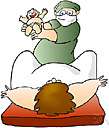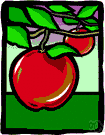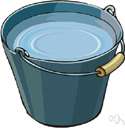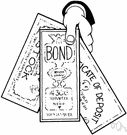bear
Also found in: Thesaurus, Medical, Legal, Financial, Acronyms, Idioms, Encyclopedia, Wikipedia.
bear
bear 1
(bâr)bear 2
(bâr)bear
(bɛə)bear
(bɛə)Bear
(bɛə)bear1
(bɛər)v. bore, borne born, bear•ing. v.t.
bear2
(bɛər)n., pl. bears, (esp. collectively) bear, n.
bear
(bâr)bear
The other forms of bear are bears, bore, borne. However, the past form and -ed participle are rarely used.
If someone bears pain or a difficult situation, they accept it in a brave way.
Endure is used in a similar way.
Bear is often used in negative sentences. If you can't bear something or someone, you dislike them very much.
If you can't bear to do something, you cannot do it because it makes you so unhappy.
If you can't stand something or someone, you dislike them very much.
Be Careful!
Don't say that you 'can't stand to do something.
If you tolerate or put up with something, you accept it, although you don't like it or approve of it. Tolerate is more formal than put up with.
bear
– bareThese words are both pronounced eə/.
Bear can be a noun or a verb.
A bear is a large, strong wild animal with thick fur and sharp claws.
If you bear a difficult situation, you accept it and are able to deal with it.
Bare is usually an adjective. Something that is bare has no covering.
suffer
– put up with – stand – bearYou can say that someone suffers pain or an unpleasant experience.
You do not use 'suffer' to say that someone tolerates an unpleasant person. You say that they put up with the person.
If you do not like someone at all, you do not say that you 'can't suffer' them. You say that you can't stand them or can't bear them.
bear
(in most senses)Past participle: borne
Gerund: bearing
| Imperative |
|---|
| bear |
| bear |
bear
(give birth to)Past participle: borne/born
Gerund: bearing
| Imperative |
|---|
| bear |
| bear |
bear
(lower the price of shares etc.)Past participle: beared
Gerund: bearing
| Imperative |
|---|
| bear |
| bear |
bear
| Noun | 1. |  bear - massive plantigrade carnivorous or omnivorous mammals with long shaggy coats and strong claws bear - massive plantigrade carnivorous or omnivorous mammals with long shaggy coats and strong clawsbear cub - a young bear carnivore - a terrestrial or aquatic flesh-eating mammal; "terrestrial carnivores have four or five clawed digits on each limb" family Ursidae, Ursidae - bears and extinct related forms bruin - a conventional name for a bear used in tales following usage in the old epic `Reynard the Fox' American black bear, Euarctos americanus, Ursus americanus, black bear - brown to black North American bear; smaller and less ferocious than the brown bear Asiatic black bear, black bear, Selenarctos thibetanus, Ursus thibetanus - bear with a black coat living in central and eastern Asia Melursus ursinus, sloth bear, Ursus ursinus - common coarse-haired long-snouted bear of south-central Asia |
| 2. |  bear - an investor with a pessimistic market outlook; an investor who expects prices to fall and so sells now in order to buy later at a lower price bear - an investor with a pessimistic market outlook; an investor who expects prices to fall and so sells now in order to buy later at a lower priceinvestor - someone who commits capital in order to gain financial returns bull - an investor with an optimistic market outlook; an investor who expects prices to rise and so buys now for resale later | |
| Verb | 1. | bear - have; "bear a resemblance"; "bear a signature" carry - have on the surface or on the skin; "carry scars" |
| 2. |  bear - cause to be born; "My wife had twins yesterday!" bear - cause to be born; "My wife had twins yesterday!"twin - give birth to twins drop - give birth; used for animals; "The cow dropped her calf this morning" foal - give birth to a foal; "the mare foaled" cub - give birth to cubs; "bears cub every year" kitten - have kittens; "our cat kittened again this year" lamb - give birth to a lamb; "the ewe lambed" litter - give birth to a litter of animals fawn - have fawns; "deer fawn" have young, calve - birth; "the whales calve at this time of year" have a bun in the oven, gestate, expect, bear, carry - be pregnant with; "She is bearing his child"; "The are expecting another child in January"; "I am carrying his child" produce, bring forth - bring forth or yield; "The tree would not produce fruit" | |
| 3. |  bear - put up with something or somebody unpleasant; "I cannot bear his constant criticism"; "The new secretary had to endure a lot of unprofessional remarks"; "he learned to tolerate the heat"; "She stuck out two years in a miserable marriage" bear - put up with something or somebody unpleasant; "I cannot bear his constant criticism"; "The new secretary had to endure a lot of unprofessional remarks"; "he learned to tolerate the heat"; "She stuck out two years in a miserable marriage"live with, swallow, accept - tolerate or accommodate oneself to; "I shall have to accept these unpleasant working conditions"; "I swallowed the insult"; "She has learned to live with her husband's little idiosyncrasies" hold still for, stand for - tolerate or bear; "I won't stand for this kind of behavior!" bear up - endure cheerfully; "She bore up under the enormous strain" take lying down - suffer without protest; suffer or endure passively; "I won't take this insult lying down" take a joke - listen to a joke at one's own expense; "Can't you take a joke?" sit out - endure to the end pay - bear (a cost or penalty), in recompense for some action; "You'll pay for this!"; "She had to pay the penalty for speaking out rashly"; "You'll pay for this opinion later" countenance, permit, allow, let - consent to, give permission; "She permitted her son to visit her estranged husband"; "I won't let the police search her basement"; "I cannot allow you to see your exam" suffer - experience (emotional) pain; "Every time her husband gets drunk, she suffers" | |
| 4. |  bear - move while holding up or supporting; "Bear gifts"; "bear a heavy load"; "bear news"; "bearing orders" bear - move while holding up or supporting; "Bear gifts"; "bear a heavy load"; "bear news"; "bearing orders"carry, transport - move while supporting, either in a vehicle or in one's hands or on one's body; "You must carry your camping gear"; "carry the suitcases to the car"; "This train is carrying nuclear waste"; "These pipes carry waste water into the river" frogmarch - carry someone against his will upside down such that each limb is held by one person | |
| 5. |  bear - bring forth, "The apple tree bore delicious apples this year"; "The unidentified plant bore gorgeous flowers" bear - bring forth, "The apple tree bore delicious apples this year"; "The unidentified plant bore gorgeous flowers"spin off - produce as a consequence of something larger seed - bear seeds crop - yield crops; "This land crops well" overbear - bear too much fruit - bear fruit; "the trees fruited early this year" bear out, underpin, corroborate, support - support with evidence or authority or make more certain or confirm; "The stories and claims were born out by the evidence" | |
| 6. | bear - take on as one's own the expenses or debts of another person; "I'll accept the charges"; "She agreed to bear the responsibility" take - take into one's possession; "We are taking an orphan from Romania"; "I'll take three salmon steaks" carry-the can, face the music - accept the unpleasant consequences of one's actions | |
| 7. |  bear - contain or hold; have within; "The jar carries wine"; "The canteen holds fresh water"; "This can contains water" bear - contain or hold; have within; "The jar carries wine"; "The canteen holds fresh water"; "This can contains water"include - have as a part, be made up out of; "The list includes the names of many famous writers" contain, hold, take - be capable of holding or containing; "This box won't take all the items"; "The flask holds one gallon" retain - hold back within; "This soil retains water"; "I retain this drug for a long time"; "the dam retains the water" | |
| 8. |  bear - bring in; "interest-bearing accounts"; "How much does this savings certificate pay annually?" bear - bring in; "interest-bearing accounts"; "How much does this savings certificate pay annually?"investment funds, investment - money that is invested with an expectation of profit earn, realise, pull in, bring in, realize, gain, make, take in, clear - earn on some commercial or business transaction; earn as salary or wages; "How much do you make a month in your new job?"; "She earns a lot in her new job"; "this merger brought in lots of money"; "He clears $5,000 each month" pay off - yield a profit or result; "His efforts finally paid off" | |
| 9. |  bear - have on one's person; "He wore a red ribbon"; "bear a scar" bear - have on one's person; "He wore a red ribbon"; "bear a scar" | |
| 10. |  bear - behave in a certain manner; "She carried herself well"; "he bore himself with dignity"; "They conducted themselves well during these difficult times" bear - behave in a certain manner; "She carried herself well"; "he bore himself with dignity"; "They conducted themselves well during these difficult times"carry, bear, hold - support or hold in a certain manner; "She holds her head high"; "He carried himself upright" fluster - be flustered; behave in a confused manner act, move - perform an action, or work out or perform (an action); "think before you act"; "We must move quickly"; "The governor should act on the new energy bill"; "The nanny acted quickly by grabbing the toddler and covering him with a wet towel" put forward, assert - insist on having one's opinions and rights recognized; "Women should assert themselves more!" deal - behave in a certain way towards others; "He deals fairly with his employees" walk around - behave in a certain manner or have certain properties; "He walks around with his nose in the air"; "She walks around with this strange boyfriend" | |
| 11. | bear - have rightfully; of rights, titles, and offices; "She bears the title of Duchess"; "He held the governorship for almost a decade" | |
| 12. |  bear - support or hold in a certain manner; "She holds her head high"; "He carried himself upright" bear - support or hold in a certain manner; "She holds her head high"; "He carried himself upright"sling - hold or carry in a sling; "he cannot button his shirt with his slinged arm" stoop - carry oneself, often habitually, with head, shoulders, and upper back bent forward; "The old man was stooping but he could walk around without a cane" piggyback - support on the back and shoulders; "He piggybacked her child so she could see the show" deport, comport, acquit, behave, conduct, bear, carry - behave in a certain manner; "She carried herself well"; "he bore himself with dignity"; "They conducted themselves well during these difficult times" bear - move while holding up or supporting; "Bear gifts"; "bear a heavy load"; "bear news"; "bearing orders" | |
| 13. |  bear - be pregnant with; "She is bearing his child"; "The are expecting another child in January"; "I am carrying his child" bear - be pregnant with; "She is bearing his child"; "The are expecting another child in January"; "I am carrying his child"expect - look forward to the birth of a child; "She is expecting in March" |
bear
1carry drop, shed, put down
support drop, give up, abandon, desert, relinquish, discontinue
bear
2 nounbear
verbbear on or upon
bear out
bear up
bear
1 [bɛəʳ]he was a huge bear of a man → era un hombre grande como un oso
the Great/Little Bear → la Osa Mayor/Menor
to be like a bear with a sore head → estar de un humor de perros
to be loaded for bear (US) → estar dispuesto para el ataque
see also brown E
see also grizzly, polar
bear cub N → osezno m
bear garden N (fig) → manicomio m, casa f de locos
bear hug N → fuerte abrazo m
bear market N (Fin) → mercado m bajista
bear pit N (fig) → manicomio m, casa f de locos
bear
2 [bɛəʳ] (bore (pt) (borne (pp)))the government bears some responsibility for this crisis → el gobierno tiene parte de responsabilidad en esta crisis
he bore no responsibility for what had happened → no era responsable de lo que había pasado
they bear most of the responsibility for elderly relatives → cargan con la mayor parte de la responsabilidad de atender a familiares ancianos
I can't bear the suspense → no puedo soportar or aguantar el suspense
I can't bear him → no lo puedo ver → no lo soporto or aguanto
the dog can't bear being shut in → el perro no soporta estar encerrado
I can't bear to look → no puedo mirar
he can't bear to talk about it → no puede hablar de ello
he can't bear to see her suffer → no soporta verla sufrir
see also brunt
a letter bearing important news → una carta que trae/traía importantes noticias
protesters bearing placards → manifestantes mfpl llevando or portando pancartas
to bear arms (frm) → portar armas (frm)
he bore himself like a soldier (posture) → tenía un porte soldadesco; (behaviour) → se comportó como un verdadero soldado
there was dignity in the way he bore himself → había dignidad en su porte
his ideas bore little relation to reality → sus ideas no tenían mucha relación con la realidad
she bore no resemblance to the girl I knew 20 years ago → no se parecía en nada a la chica que había conocido 20 años atrás
the room bore all the signs of a violent struggle → el cuarto conservaba todas las huellas de una riña violenta
to bear a grudge → guardar rencor
she bears him no ill-will (grudge) → no le guarda rencor; (hostility) → no siente ninguna animadversión hacia él
see also witness A2
see also mind A3
see also bring 2
injured people were borne away in ambulances → se llevaron a los heridos en ambulancias
the wreckage was borne away by or on the tide → los restos del naufragio fueron arrastrados por la corriente
the ferry was bearing down on us → el ferry se nos echaba encima
you have to bear down hard on the screw → hay que apretar fuerte el tornillo
the facts seem to bear out her story → los hechos parecen confirmar su historia
their prediction was not borne out by events → sus predicciones no se vieron confirmadas por los sucesos
perhaps you can bear me out on this, Alan? → Alan, ¿me puedes confirmar que estoy en lo cierto?
she's bearing up well under the circumstances → lo está llevando bien dadas las circunstancias
"how are you?" - "bearing up!" → -¿qué tal? -¡voy aguantando!
bear up! it's nearly over → ¡ánimo, que ya queda poco!
the children bore up well during the visit to the museum → los niños aguantaron bien la vista al museo
thank you for bearing with us during this difficult time → gracias por tener paciencia con nosotros en estos tiempos difíciles
if I repeat myself, please bear with me → les ruego que tengan paciencia si me repito
bear with it, it gets better → ten un poco de paciencia or aguanta un poco, ya verás como mejora
if you'll bear with me, I'll explain → si esperas un poco, te explico
bear
[ˈbɛər]to bear responsibility for sth → assumer la responsabilité de qch
to bear the responsibility of doing sth → être responsable de faire qch
I can't bear him → Je ne peux pas le supporter., Je ne peux pas le souffrir.
I can't bear it!
BUT C'est insupportable!.
I can't bear to do ... → je ne peux pas faire ...
How can you bear to talk to him? → Comment est-ce que tu peux lui parler?
to bear little relation to sth → n'avoir que peu de rapport avec qch, avoir peu de rapport avec qch
The room bore all the signs of a violent struggle
BUT L'état de la pièce indiquait qu'une violente bagarre y avait eu lieu.
The houses bear the marks of bullet holes
BUT Les maisons gardent la trace d'impacts de balles.
to bear comparison with → soutenir la comparaison avec
to bear right → obliquer à droite, se diriger vers la droite
to bring sth to bear on sth (= use to deal with sth) → faire peser qch sur qch
He bore up well → Il a tenu le coup.
bear up! → tiens bon!
to bear up under pain → supporter la douleur
bear with me a minute → un moment, s'il vous plaît
bear
:bear
:bear
:bear
1 pret <bore>, ptp <borne>bear
2bear
1 [bɛəʳ] (bore (vb: pt) (borne (pp)))to bear some resemblance to → somigliare a
he bore himself like a soldier (of posture) → aveva un portamento militare (of behaviour) → si comportò da soldato
the love he bore her → l'amore che le portava
to bear sb ill will → portare or serbare rancore a qn
the roof couldn't bear the weight of the snow → il tetto non ha retto il or al peso della neve
it won't bear close examination → non bisogna guardarlo troppo da vicino
I can't bear him → non lo posso soffrire or sopportare
I can't bear to look → non ho il coraggio di guardare
it doesn't bear thinking about → non ci si può neanche pensare
to bear away (Naut) → poggiare
to bring pressure to bear on sb → fare pressione su qn
to bring one's mind to bear on sth → concentrarsi su qc
bear with me a minute → solo un attimo, prego
if you'll bear with me ... → se ha la cortesia di aspettare (un attimo) ...
bear
2 [bɛəʳ] n → orso/a (Stock Exchange) → ribassista m/fthe Great Bear (Astron) → l'Orsa Maggiore
to be like a bear with a sore head (hum) → avere la luna di traverso